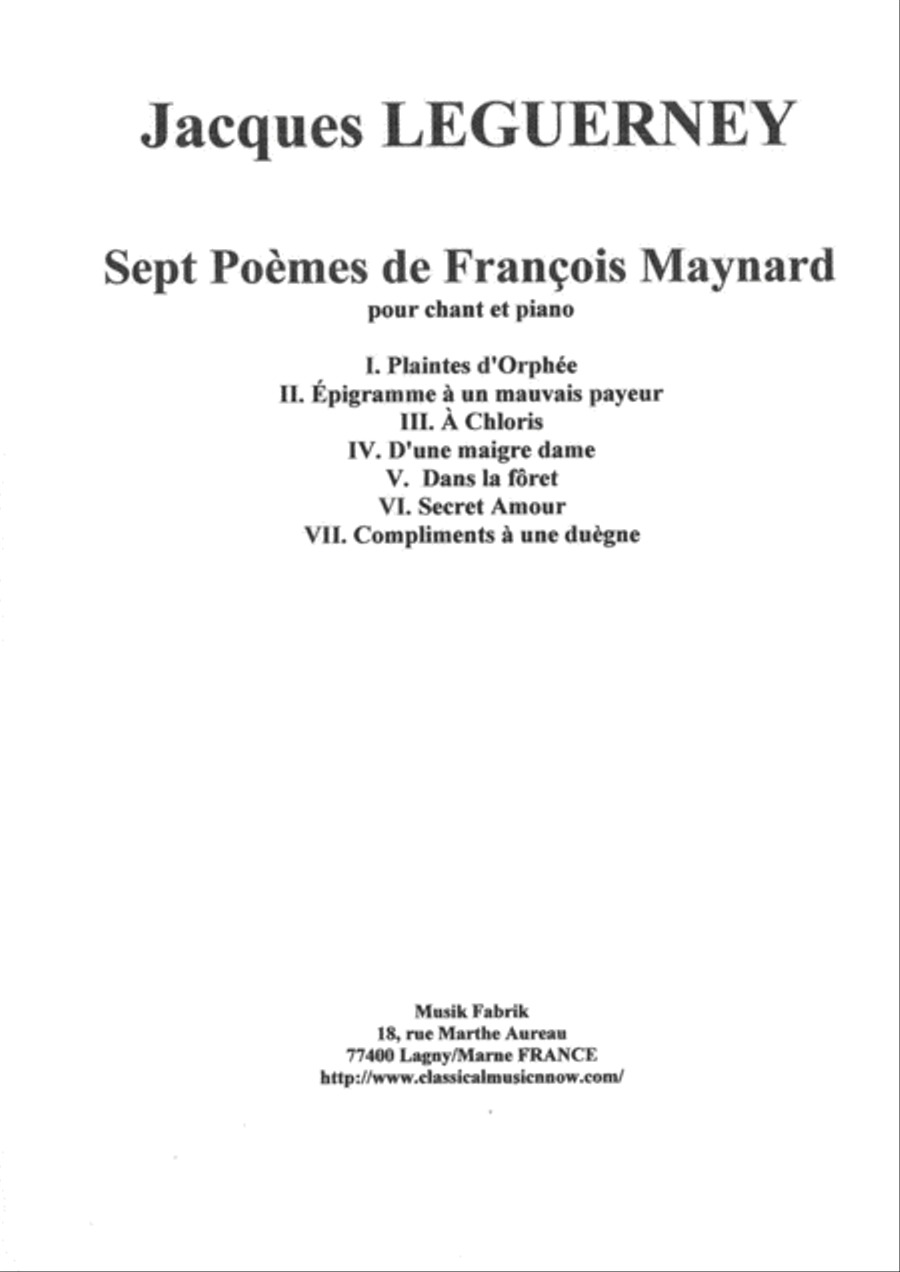Medium-Low Voice,Vocal Solo - Level 4 - Digital Download SKU: A0.534413 Composed by Jacques Leguerney. 20th Century,Concert,Standards. 38 pages. Musik Fabrik Music Publishing #3478897. Published by Musik Fabrik Music Publishing (A0.534413). 1. Plaintes d'Orphée2. Ã?pigramme à un mauvais payeur3. à Chloris4. D'une maigre dame5. Dans le fôret6. Secret Amour 7. Complients à une duègnehttps://www.youtube.com/watch?v=Uo7KQ89pzz4Gérard Souzay, French baritone, said of Jacques Leguerneyâ??s music: â??How does one describe this music which is, at the same time, classic and modern? It is pure, but colorfully nuanced; it speaks to the heart as well as the mind: at times calm; at times witty; wise, yet sensual. The music of Jacques Leguerney is un jardin à la française, both elegant and stylish.â? Jacques Leguerney was born in Le Havre on 19 November 1906. His uncle bought his first piano and encouraged him to study and write music. He wrote chamber works, and took a few semesters of harmony with Nadia Boulanger, who arranged for a performance of his Epitaphe guerrière and Clair de lune in a concert organized by the Société musical indépendante at the Salle Pleyel. However, he decided not to continue his studies. He felt that his gift was natural and spontaneous, and that anyone who understood music should not have to do exercises to learn to compose. In 1928, Jane Bathori took an interest in Leguerney, including two songs during her tour in Argentina, and the following year at the Salle Erard in Paris. In 1932, when his father died, Leguerney took over the family business and stopped composing until the outbreak of World War II. The period extending from the German occupation of France to the end of the 1940s constitutes one of the important periods of Leguerneyâ??s musical life. He began his extended song cycle, Poèmes de la Pléiade, and wrote many songs upon poems of Paul-Jean Toulet. He also continued to compose chamber music, including the Sonatine pour violon et piano, the â??Fantasie pour pianoâ? and the Quatuor à cordes en Ré. An important year for Leguerney was 1943. He met musical colleagues who would become his major interpreters. These included Gérard Souzay as well as his half-sister, soprano Geneviève Touraine; pianist Jacqueline Robin (Bonneau), Pierre Bernac, and Francis Poulenc. Robin (Bonneau) particularly influenced Leguerneyâ??s style. His piano accompaniments were created specifically for her virtuosic and sensitive style of pianism. Bernac observed that Leguerney wrote melodies de pianiste. In 1946, Leguerney created a ballet on the mythological story of Endymion. The premiere was at the Opéra de Paris on 27 July 1949, with choreography by Serge Lifar. The Opéra de Paris immediately commissioned a second work, which was La Vénus noire, based upon a short story by Prosper Mérimée. This ballet was never produced, due to disagreements with the choreographer. Leguerney became discouraged and this situation was to lead to the end of his interest in composing. However, the years 1950-1954 brought Leguerney widespread recognition as he created his beautiful mélodie cycles including La Nuit, La Solitude (for piano as well as an orchestration), Le Paysage, and Le Carnaval, as well as the cantata Psaume LXII de David. Gérard Souzay requested many new works for his recitals and premiered La Nuit, Le Carnaval and
